Evaluating Defences Against Politically Motivated Cybercrime (2018)
VerifiedAdded on 2023/06/11
|12
|3306
|156
Report
AI Summary
This report analyzes the increasing threat of politically motivated cyber-attacks, also known as hacktivism, and their potential consequences. It highlights examples such as the Panama Papers leak, the Democratic National Committee email leak, the Mirai Botnet attack on the Trump and Clinton campaigns, and the Singapore cyber-attacks in 2013. The report discusses the motivations behind these attacks, including causing harm to political organizations and exposing illegal operations. Furthermore, it evaluates various defenses against these attacks, such as improving cyber security infrastructure, data encryption, and security measures for IoT devices. The report concludes by assessing the effectiveness of these defenses in mitigating the risks associated with politically motivated cyber-attacks, emphasizing the need for continuous improvement in cyber security strategies to protect against evolving threats.
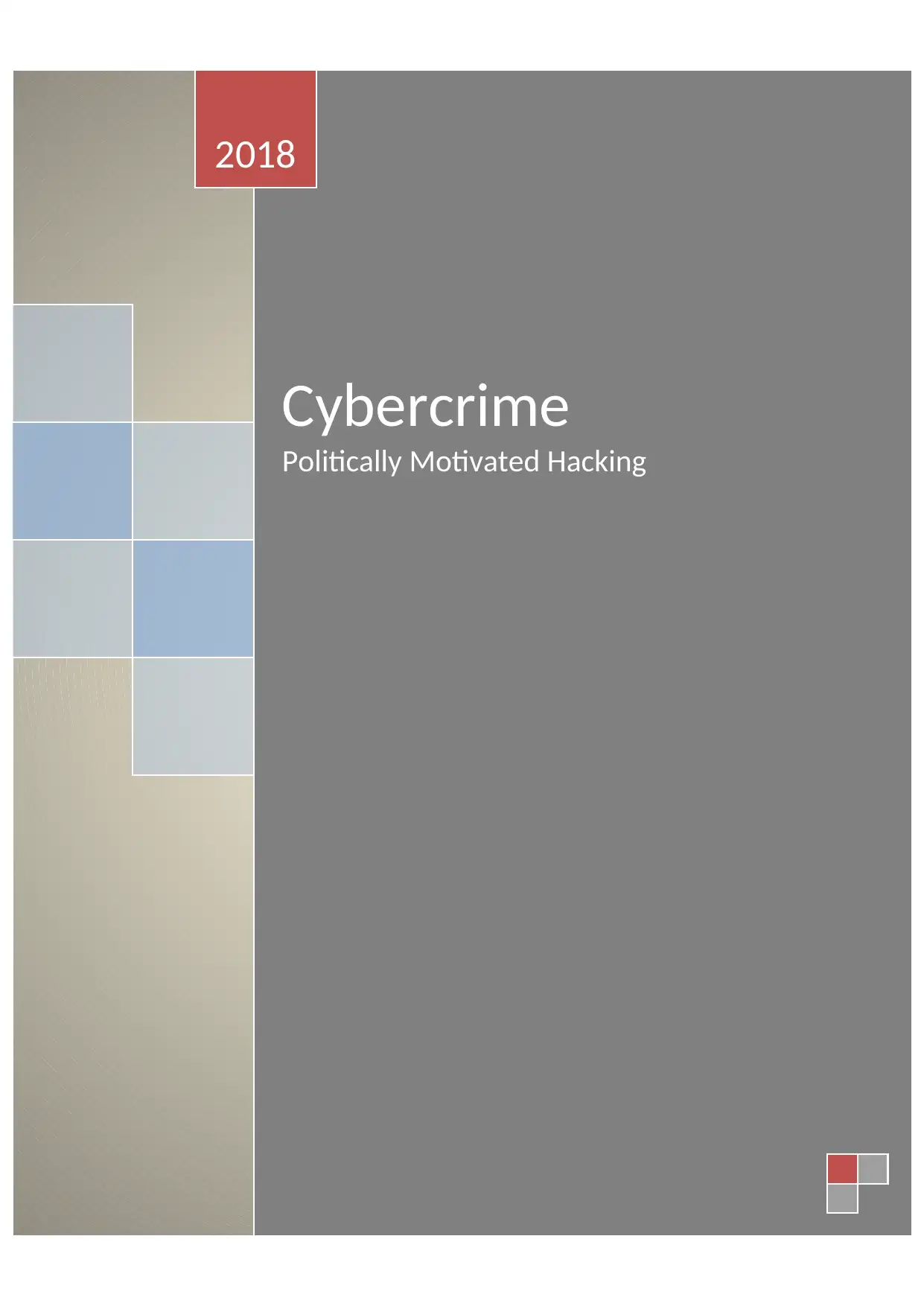
Cybercrime
Politically Motivated Hacking
2018
Politically Motivated Hacking
2018
Paraphrase This Document
Need a fresh take? Get an instant paraphrase of this document with our AI Paraphraser
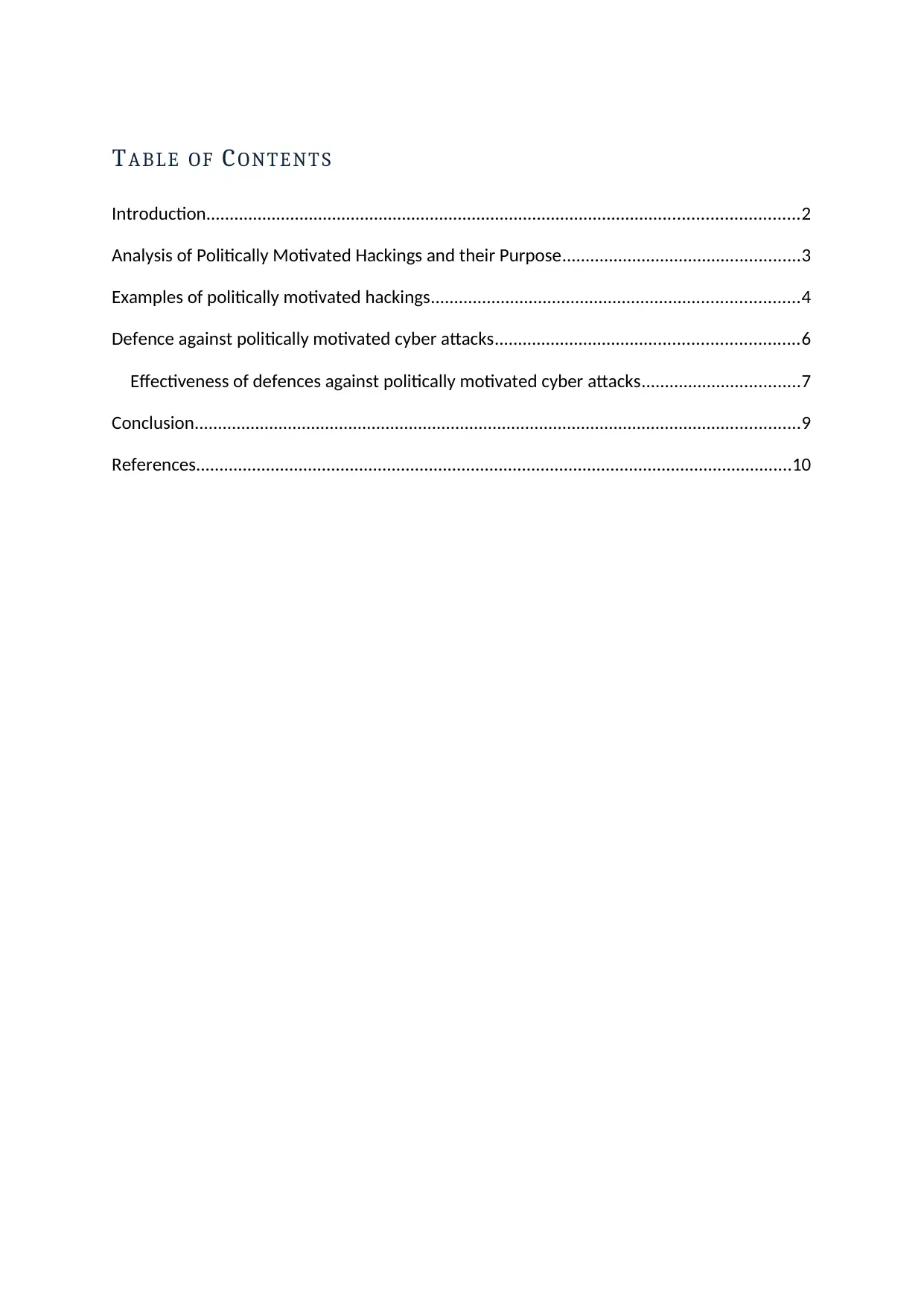
TABLE OF CONTENTS
Introduction...............................................................................................................................2
Analysis of Politically Motivated Hackings and their Purpose...................................................3
Examples of politically motivated hackings...............................................................................4
Defence against politically motivated cyber attacks.................................................................6
Effectiveness of defences against politically motivated cyber attacks..................................7
Conclusion..................................................................................................................................9
References................................................................................................................................10
Introduction...............................................................................................................................2
Analysis of Politically Motivated Hackings and their Purpose...................................................3
Examples of politically motivated hackings...............................................................................4
Defence against politically motivated cyber attacks.................................................................6
Effectiveness of defences against politically motivated cyber attacks..................................7
Conclusion..................................................................................................................................9
References................................................................................................................................10
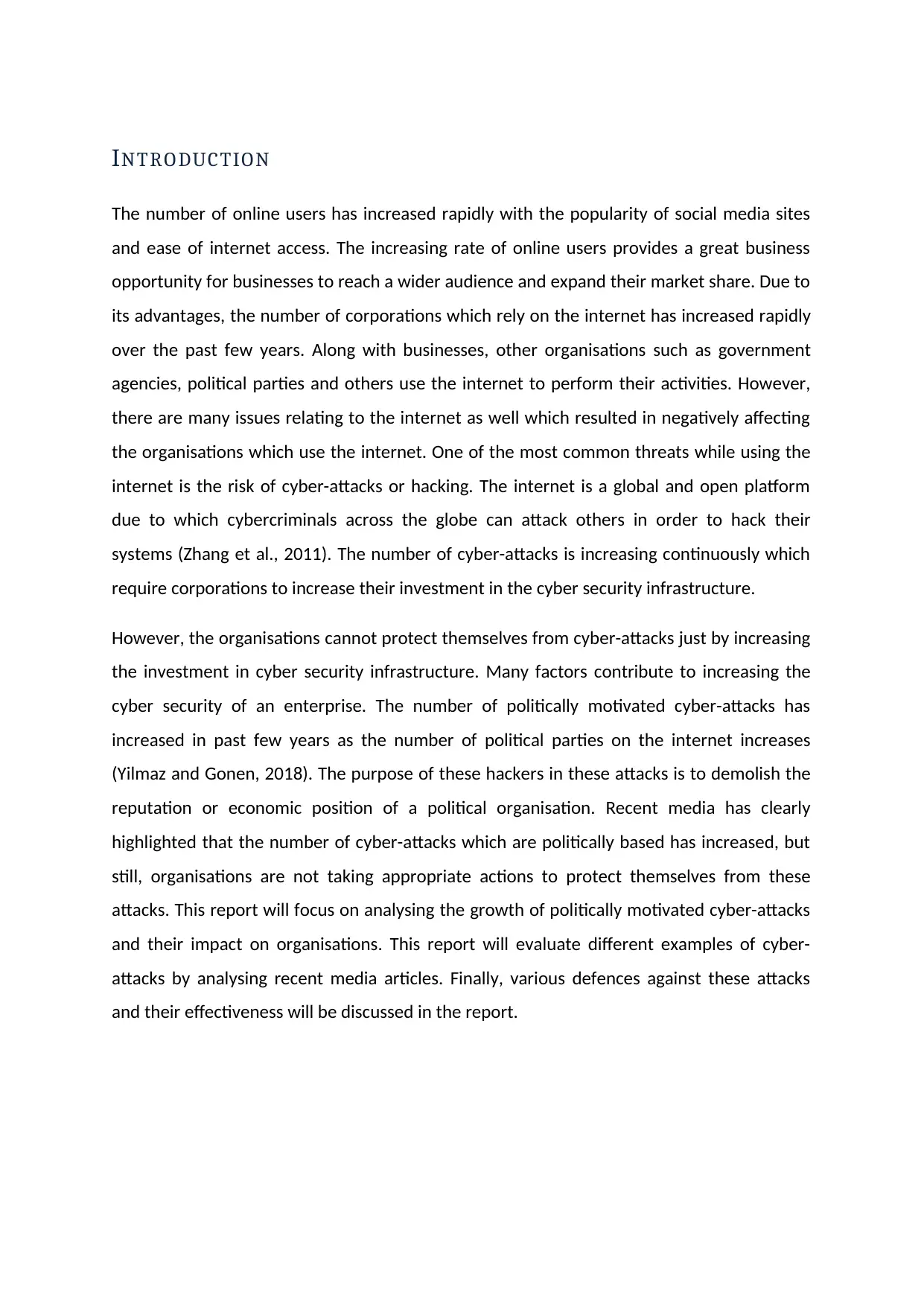
INTRODUCTION
The number of online users has increased rapidly with the popularity of social media sites
and ease of internet access. The increasing rate of online users provides a great business
opportunity for businesses to reach a wider audience and expand their market share. Due to
its advantages, the number of corporations which rely on the internet has increased rapidly
over the past few years. Along with businesses, other organisations such as government
agencies, political parties and others use the internet to perform their activities. However,
there are many issues relating to the internet as well which resulted in negatively affecting
the organisations which use the internet. One of the most common threats while using the
internet is the risk of cyber-attacks or hacking. The internet is a global and open platform
due to which cybercriminals across the globe can attack others in order to hack their
systems (Zhang et al., 2011). The number of cyber-attacks is increasing continuously which
require corporations to increase their investment in the cyber security infrastructure.
However, the organisations cannot protect themselves from cyber-attacks just by increasing
the investment in cyber security infrastructure. Many factors contribute to increasing the
cyber security of an enterprise. The number of politically motivated cyber-attacks has
increased in past few years as the number of political parties on the internet increases
(Yilmaz and Gonen, 2018). The purpose of these hackers in these attacks is to demolish the
reputation or economic position of a political organisation. Recent media has clearly
highlighted that the number of cyber-attacks which are politically based has increased, but
still, organisations are not taking appropriate actions to protect themselves from these
attacks. This report will focus on analysing the growth of politically motivated cyber-attacks
and their impact on organisations. This report will evaluate different examples of cyber-
attacks by analysing recent media articles. Finally, various defences against these attacks
and their effectiveness will be discussed in the report.
The number of online users has increased rapidly with the popularity of social media sites
and ease of internet access. The increasing rate of online users provides a great business
opportunity for businesses to reach a wider audience and expand their market share. Due to
its advantages, the number of corporations which rely on the internet has increased rapidly
over the past few years. Along with businesses, other organisations such as government
agencies, political parties and others use the internet to perform their activities. However,
there are many issues relating to the internet as well which resulted in negatively affecting
the organisations which use the internet. One of the most common threats while using the
internet is the risk of cyber-attacks or hacking. The internet is a global and open platform
due to which cybercriminals across the globe can attack others in order to hack their
systems (Zhang et al., 2011). The number of cyber-attacks is increasing continuously which
require corporations to increase their investment in the cyber security infrastructure.
However, the organisations cannot protect themselves from cyber-attacks just by increasing
the investment in cyber security infrastructure. Many factors contribute to increasing the
cyber security of an enterprise. The number of politically motivated cyber-attacks has
increased in past few years as the number of political parties on the internet increases
(Yilmaz and Gonen, 2018). The purpose of these hackers in these attacks is to demolish the
reputation or economic position of a political organisation. Recent media has clearly
highlighted that the number of cyber-attacks which are politically based has increased, but
still, organisations are not taking appropriate actions to protect themselves from these
attacks. This report will focus on analysing the growth of politically motivated cyber-attacks
and their impact on organisations. This report will evaluate different examples of cyber-
attacks by analysing recent media articles. Finally, various defences against these attacks
and their effectiveness will be discussed in the report.
⊘ This is a preview!⊘
Do you want full access?
Subscribe today to unlock all pages.

Trusted by 1+ million students worldwide
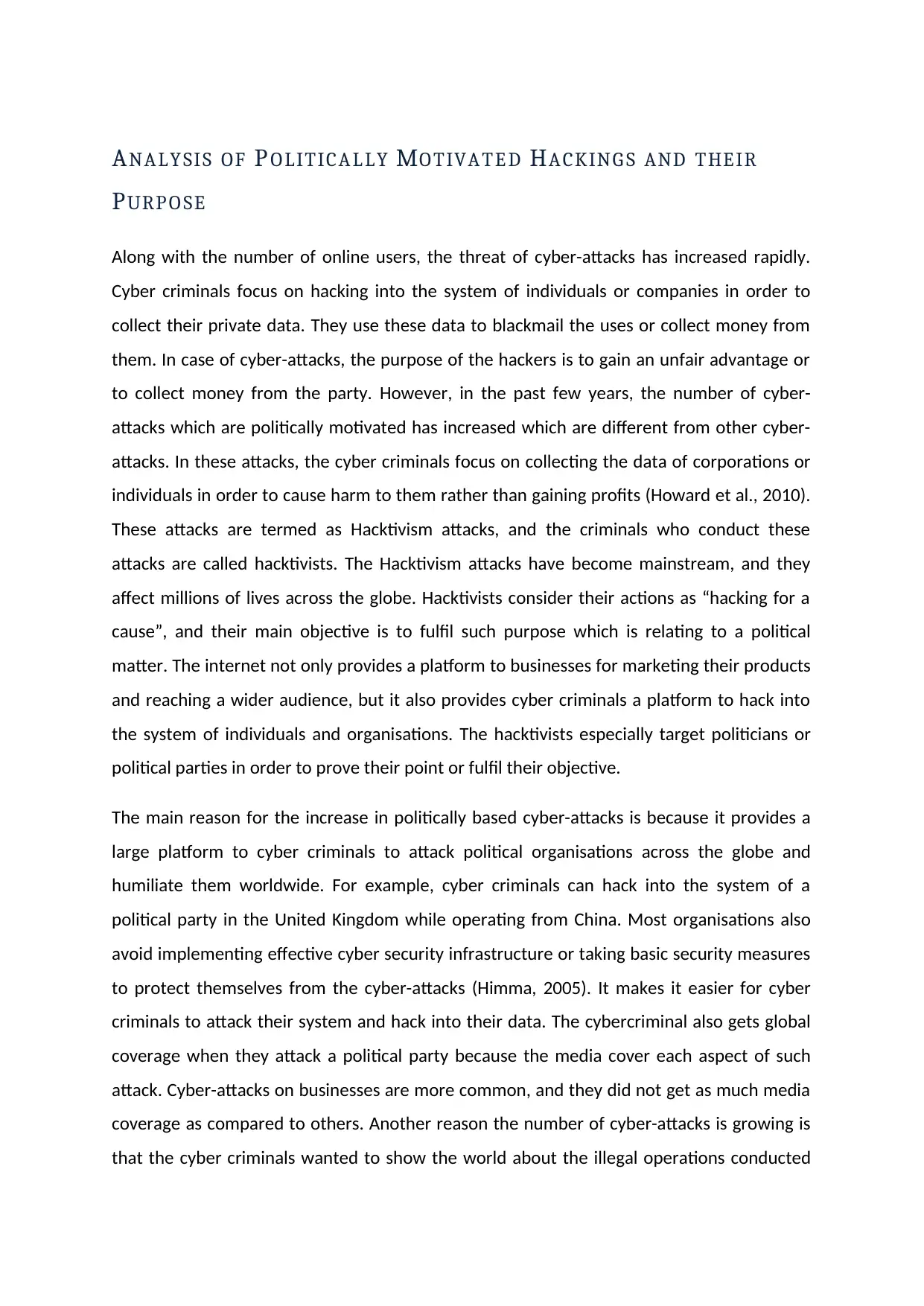
ANALYSIS OF POLITICALLY MOTIVATED HACKINGS AND THEIR
PURPOSE
Along with the number of online users, the threat of cyber-attacks has increased rapidly.
Cyber criminals focus on hacking into the system of individuals or companies in order to
collect their private data. They use these data to blackmail the uses or collect money from
them. In case of cyber-attacks, the purpose of the hackers is to gain an unfair advantage or
to collect money from the party. However, in the past few years, the number of cyber-
attacks which are politically motivated has increased which are different from other cyber-
attacks. In these attacks, the cyber criminals focus on collecting the data of corporations or
individuals in order to cause harm to them rather than gaining profits (Howard et al., 2010).
These attacks are termed as Hacktivism attacks, and the criminals who conduct these
attacks are called hacktivists. The Hacktivism attacks have become mainstream, and they
affect millions of lives across the globe. Hacktivists consider their actions as “hacking for a
cause”, and their main objective is to fulfil such purpose which is relating to a political
matter. The internet not only provides a platform to businesses for marketing their products
and reaching a wider audience, but it also provides cyber criminals a platform to hack into
the system of individuals and organisations. The hacktivists especially target politicians or
political parties in order to prove their point or fulfil their objective.
The main reason for the increase in politically based cyber-attacks is because it provides a
large platform to cyber criminals to attack political organisations across the globe and
humiliate them worldwide. For example, cyber criminals can hack into the system of a
political party in the United Kingdom while operating from China. Most organisations also
avoid implementing effective cyber security infrastructure or taking basic security measures
to protect themselves from the cyber-attacks (Himma, 2005). It makes it easier for cyber
criminals to attack their system and hack into their data. The cybercriminal also gets global
coverage when they attack a political party because the media cover each aspect of such
attack. Cyber-attacks on businesses are more common, and they did not get as much media
coverage as compared to others. Another reason the number of cyber-attacks is growing is
that the cyber criminals wanted to show the world about the illegal operations conducted
PURPOSE
Along with the number of online users, the threat of cyber-attacks has increased rapidly.
Cyber criminals focus on hacking into the system of individuals or companies in order to
collect their private data. They use these data to blackmail the uses or collect money from
them. In case of cyber-attacks, the purpose of the hackers is to gain an unfair advantage or
to collect money from the party. However, in the past few years, the number of cyber-
attacks which are politically motivated has increased which are different from other cyber-
attacks. In these attacks, the cyber criminals focus on collecting the data of corporations or
individuals in order to cause harm to them rather than gaining profits (Howard et al., 2010).
These attacks are termed as Hacktivism attacks, and the criminals who conduct these
attacks are called hacktivists. The Hacktivism attacks have become mainstream, and they
affect millions of lives across the globe. Hacktivists consider their actions as “hacking for a
cause”, and their main objective is to fulfil such purpose which is relating to a political
matter. The internet not only provides a platform to businesses for marketing their products
and reaching a wider audience, but it also provides cyber criminals a platform to hack into
the system of individuals and organisations. The hacktivists especially target politicians or
political parties in order to prove their point or fulfil their objective.
The main reason for the increase in politically based cyber-attacks is because it provides a
large platform to cyber criminals to attack political organisations across the globe and
humiliate them worldwide. For example, cyber criminals can hack into the system of a
political party in the United Kingdom while operating from China. Most organisations also
avoid implementing effective cyber security infrastructure or taking basic security measures
to protect themselves from the cyber-attacks (Himma, 2005). It makes it easier for cyber
criminals to attack their system and hack into their data. The cybercriminal also gets global
coverage when they attack a political party because the media cover each aspect of such
attack. Cyber-attacks on businesses are more common, and they did not get as much media
coverage as compared to others. Another reason the number of cyber-attacks is growing is
that the cyber criminals wanted to show the world about the illegal operations conducted
Paraphrase This Document
Need a fresh take? Get an instant paraphrase of this document with our AI Paraphraser
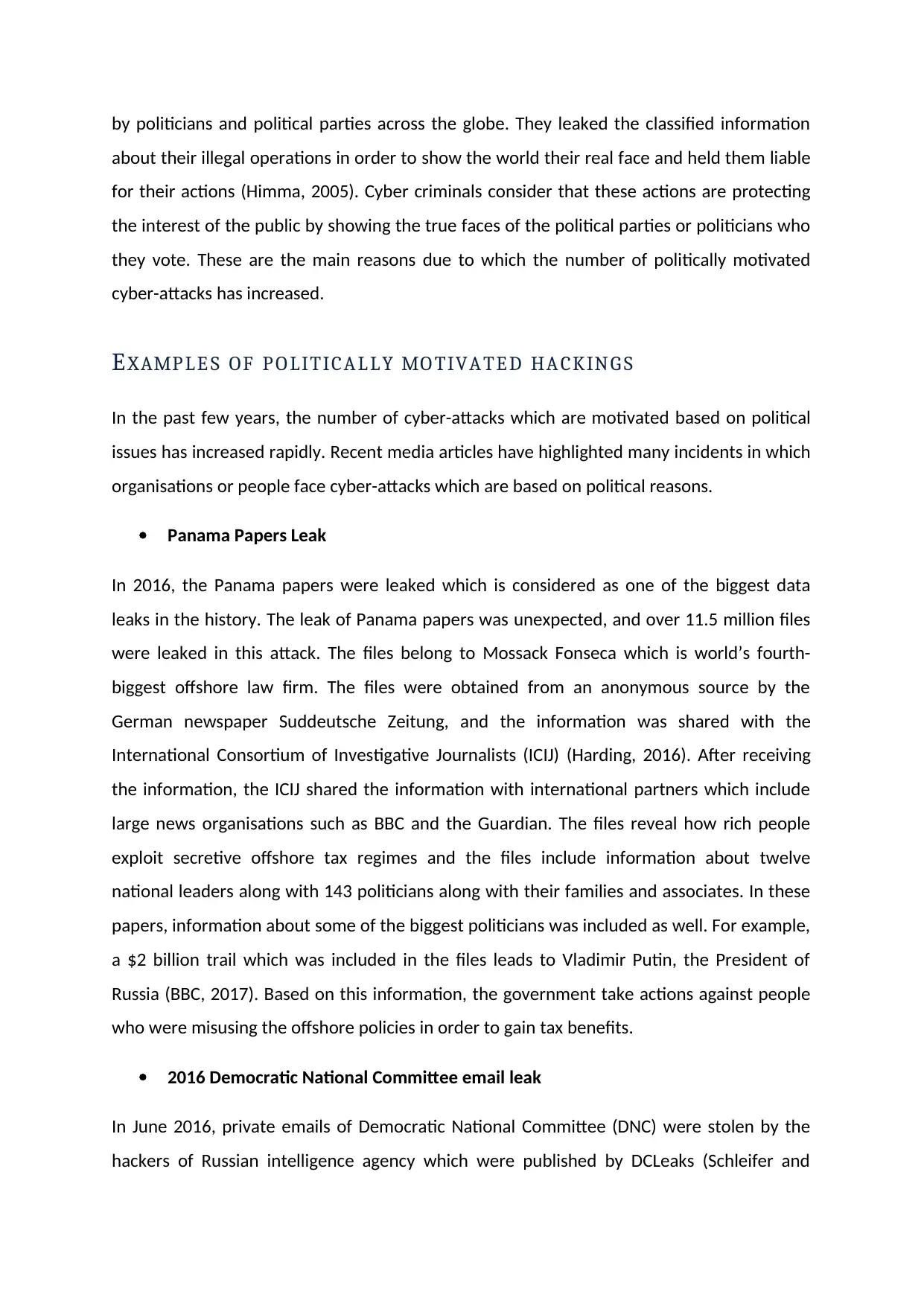
by politicians and political parties across the globe. They leaked the classified information
about their illegal operations in order to show the world their real face and held them liable
for their actions (Himma, 2005). Cyber criminals consider that these actions are protecting
the interest of the public by showing the true faces of the political parties or politicians who
they vote. These are the main reasons due to which the number of politically motivated
cyber-attacks has increased.
EXAMPLES OF POLITICALLY MOTIVATED HACKINGS
In the past few years, the number of cyber-attacks which are motivated based on political
issues has increased rapidly. Recent media articles have highlighted many incidents in which
organisations or people face cyber-attacks which are based on political reasons.
Panama Papers Leak
In 2016, the Panama papers were leaked which is considered as one of the biggest data
leaks in the history. The leak of Panama papers was unexpected, and over 11.5 million files
were leaked in this attack. The files belong to Mossack Fonseca which is world’s fourth-
biggest offshore law firm. The files were obtained from an anonymous source by the
German newspaper Suddeutsche Zeitung, and the information was shared with the
International Consortium of Investigative Journalists (ICIJ) (Harding, 2016). After receiving
the information, the ICIJ shared the information with international partners which include
large news organisations such as BBC and the Guardian. The files reveal how rich people
exploit secretive offshore tax regimes and the files include information about twelve
national leaders along with 143 politicians along with their families and associates. In these
papers, information about some of the biggest politicians was included as well. For example,
a $2 billion trail which was included in the files leads to Vladimir Putin, the President of
Russia (BBC, 2017). Based on this information, the government take actions against people
who were misusing the offshore policies in order to gain tax benefits.
2016 Democratic National Committee email leak
In June 2016, private emails of Democratic National Committee (DNC) were stolen by the
hackers of Russian intelligence agency which were published by DCLeaks (Schleifer and
about their illegal operations in order to show the world their real face and held them liable
for their actions (Himma, 2005). Cyber criminals consider that these actions are protecting
the interest of the public by showing the true faces of the political parties or politicians who
they vote. These are the main reasons due to which the number of politically motivated
cyber-attacks has increased.
EXAMPLES OF POLITICALLY MOTIVATED HACKINGS
In the past few years, the number of cyber-attacks which are motivated based on political
issues has increased rapidly. Recent media articles have highlighted many incidents in which
organisations or people face cyber-attacks which are based on political reasons.
Panama Papers Leak
In 2016, the Panama papers were leaked which is considered as one of the biggest data
leaks in the history. The leak of Panama papers was unexpected, and over 11.5 million files
were leaked in this attack. The files belong to Mossack Fonseca which is world’s fourth-
biggest offshore law firm. The files were obtained from an anonymous source by the
German newspaper Suddeutsche Zeitung, and the information was shared with the
International Consortium of Investigative Journalists (ICIJ) (Harding, 2016). After receiving
the information, the ICIJ shared the information with international partners which include
large news organisations such as BBC and the Guardian. The files reveal how rich people
exploit secretive offshore tax regimes and the files include information about twelve
national leaders along with 143 politicians along with their families and associates. In these
papers, information about some of the biggest politicians was included as well. For example,
a $2 billion trail which was included in the files leads to Vladimir Putin, the President of
Russia (BBC, 2017). Based on this information, the government take actions against people
who were misusing the offshore policies in order to gain tax benefits.
2016 Democratic National Committee email leak
In June 2016, private emails of Democratic National Committee (DNC) were stolen by the
hackers of Russian intelligence agency which were published by DCLeaks (Schleifer and
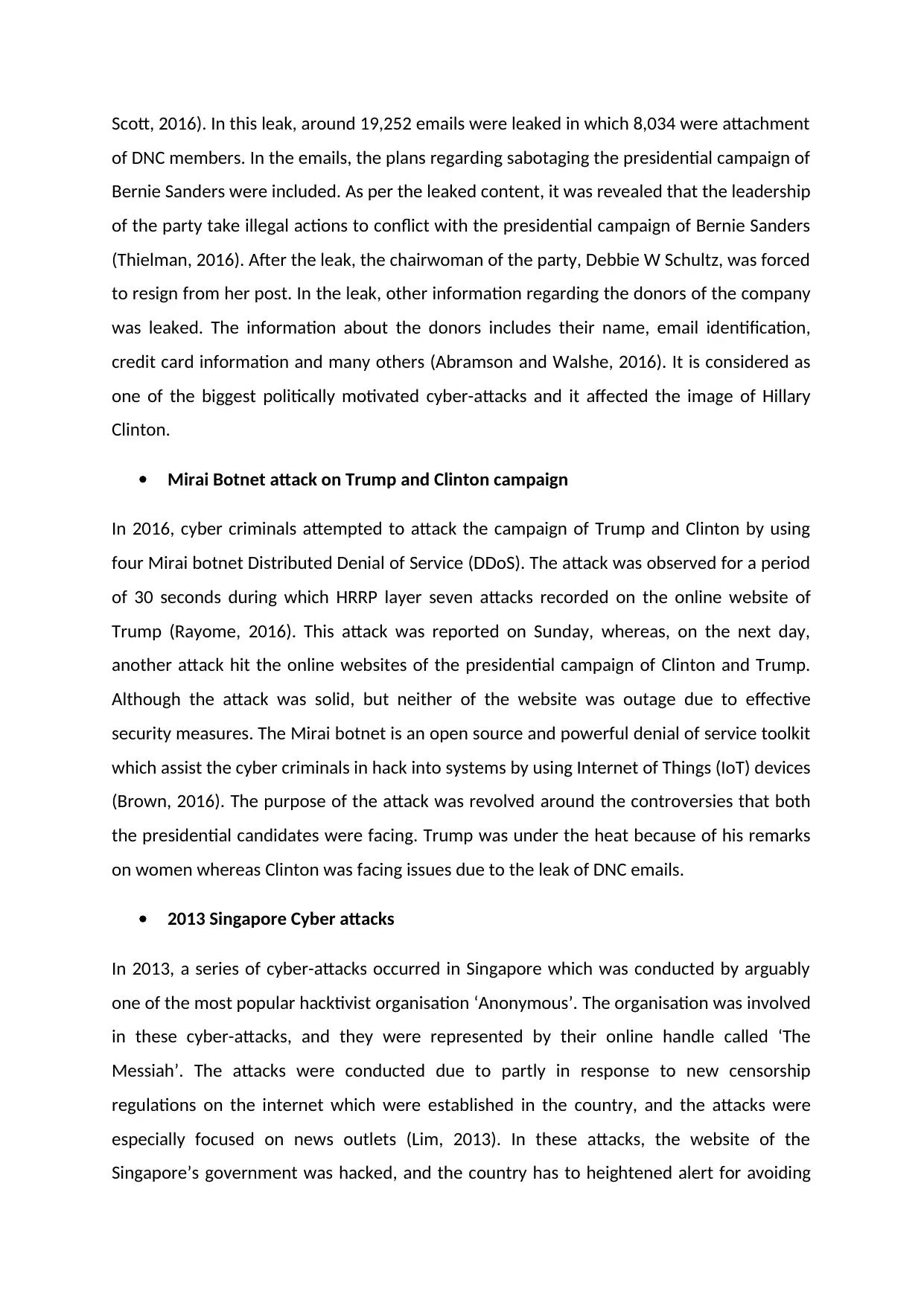
Scott, 2016). In this leak, around 19,252 emails were leaked in which 8,034 were attachment
of DNC members. In the emails, the plans regarding sabotaging the presidential campaign of
Bernie Sanders were included. As per the leaked content, it was revealed that the leadership
of the party take illegal actions to conflict with the presidential campaign of Bernie Sanders
(Thielman, 2016). After the leak, the chairwoman of the party, Debbie W Schultz, was forced
to resign from her post. In the leak, other information regarding the donors of the company
was leaked. The information about the donors includes their name, email identification,
credit card information and many others (Abramson and Walshe, 2016). It is considered as
one of the biggest politically motivated cyber-attacks and it affected the image of Hillary
Clinton.
Mirai Botnet attack on Trump and Clinton campaign
In 2016, cyber criminals attempted to attack the campaign of Trump and Clinton by using
four Mirai botnet Distributed Denial of Service (DDoS). The attack was observed for a period
of 30 seconds during which HRRP layer seven attacks recorded on the online website of
Trump (Rayome, 2016). This attack was reported on Sunday, whereas, on the next day,
another attack hit the online websites of the presidential campaign of Clinton and Trump.
Although the attack was solid, but neither of the website was outage due to effective
security measures. The Mirai botnet is an open source and powerful denial of service toolkit
which assist the cyber criminals in hack into systems by using Internet of Things (IoT) devices
(Brown, 2016). The purpose of the attack was revolved around the controversies that both
the presidential candidates were facing. Trump was under the heat because of his remarks
on women whereas Clinton was facing issues due to the leak of DNC emails.
2013 Singapore Cyber attacks
In 2013, a series of cyber-attacks occurred in Singapore which was conducted by arguably
one of the most popular hacktivist organisation ‘Anonymous’. The organisation was involved
in these cyber-attacks, and they were represented by their online handle called ‘The
Messiah’. The attacks were conducted due to partly in response to new censorship
regulations on the internet which were established in the country, and the attacks were
especially focused on news outlets (Lim, 2013). In these attacks, the website of the
Singapore’s government was hacked, and the country has to heightened alert for avoiding
of DNC members. In the emails, the plans regarding sabotaging the presidential campaign of
Bernie Sanders were included. As per the leaked content, it was revealed that the leadership
of the party take illegal actions to conflict with the presidential campaign of Bernie Sanders
(Thielman, 2016). After the leak, the chairwoman of the party, Debbie W Schultz, was forced
to resign from her post. In the leak, other information regarding the donors of the company
was leaked. The information about the donors includes their name, email identification,
credit card information and many others (Abramson and Walshe, 2016). It is considered as
one of the biggest politically motivated cyber-attacks and it affected the image of Hillary
Clinton.
Mirai Botnet attack on Trump and Clinton campaign
In 2016, cyber criminals attempted to attack the campaign of Trump and Clinton by using
four Mirai botnet Distributed Denial of Service (DDoS). The attack was observed for a period
of 30 seconds during which HRRP layer seven attacks recorded on the online website of
Trump (Rayome, 2016). This attack was reported on Sunday, whereas, on the next day,
another attack hit the online websites of the presidential campaign of Clinton and Trump.
Although the attack was solid, but neither of the website was outage due to effective
security measures. The Mirai botnet is an open source and powerful denial of service toolkit
which assist the cyber criminals in hack into systems by using Internet of Things (IoT) devices
(Brown, 2016). The purpose of the attack was revolved around the controversies that both
the presidential candidates were facing. Trump was under the heat because of his remarks
on women whereas Clinton was facing issues due to the leak of DNC emails.
2013 Singapore Cyber attacks
In 2013, a series of cyber-attacks occurred in Singapore which was conducted by arguably
one of the most popular hacktivist organisation ‘Anonymous’. The organisation was involved
in these cyber-attacks, and they were represented by their online handle called ‘The
Messiah’. The attacks were conducted due to partly in response to new censorship
regulations on the internet which were established in the country, and the attacks were
especially focused on news outlets (Lim, 2013). In these attacks, the website of the
Singapore’s government was hacked, and the country has to heightened alert for avoiding
⊘ This is a preview!⊘
Do you want full access?
Subscribe today to unlock all pages.

Trusted by 1+ million students worldwide
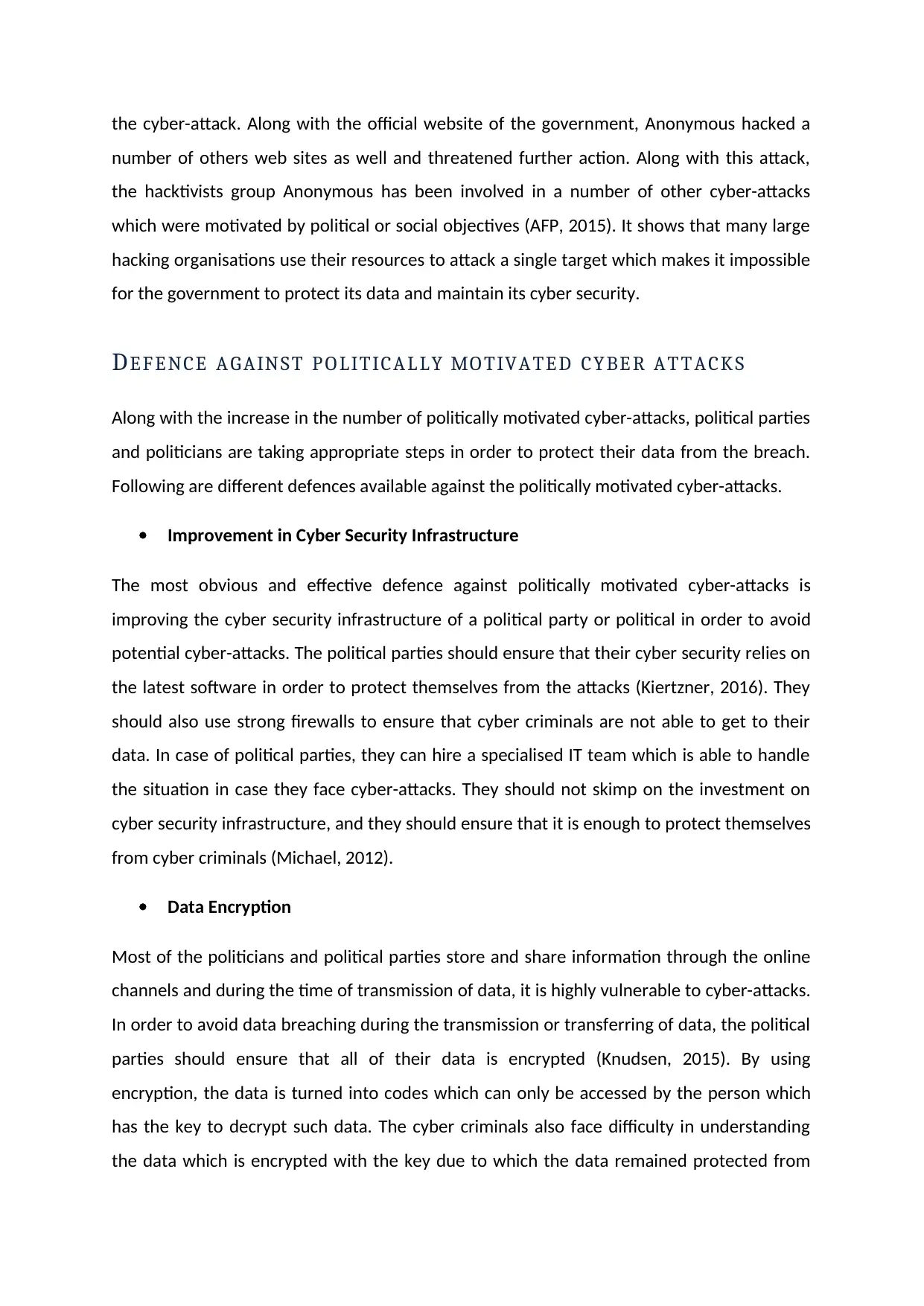
the cyber-attack. Along with the official website of the government, Anonymous hacked a
number of others web sites as well and threatened further action. Along with this attack,
the hacktivists group Anonymous has been involved in a number of other cyber-attacks
which were motivated by political or social objectives (AFP, 2015). It shows that many large
hacking organisations use their resources to attack a single target which makes it impossible
for the government to protect its data and maintain its cyber security.
DEFENCE AGAINST POLITICALLY MOTIVATED CYBER ATTACKS
Along with the increase in the number of politically motivated cyber-attacks, political parties
and politicians are taking appropriate steps in order to protect their data from the breach.
Following are different defences available against the politically motivated cyber-attacks.
Improvement in Cyber Security Infrastructure
The most obvious and effective defence against politically motivated cyber-attacks is
improving the cyber security infrastructure of a political party or political in order to avoid
potential cyber-attacks. The political parties should ensure that their cyber security relies on
the latest software in order to protect themselves from the attacks (Kiertzner, 2016). They
should also use strong firewalls to ensure that cyber criminals are not able to get to their
data. In case of political parties, they can hire a specialised IT team which is able to handle
the situation in case they face cyber-attacks. They should not skimp on the investment on
cyber security infrastructure, and they should ensure that it is enough to protect themselves
from cyber criminals (Michael, 2012).
Data Encryption
Most of the politicians and political parties store and share information through the online
channels and during the time of transmission of data, it is highly vulnerable to cyber-attacks.
In order to avoid data breaching during the transmission or transferring of data, the political
parties should ensure that all of their data is encrypted (Knudsen, 2015). By using
encryption, the data is turned into codes which can only be accessed by the person which
has the key to decrypt such data. The cyber criminals also face difficulty in understanding
the data which is encrypted with the key due to which the data remained protected from
number of others web sites as well and threatened further action. Along with this attack,
the hacktivists group Anonymous has been involved in a number of other cyber-attacks
which were motivated by political or social objectives (AFP, 2015). It shows that many large
hacking organisations use their resources to attack a single target which makes it impossible
for the government to protect its data and maintain its cyber security.
DEFENCE AGAINST POLITICALLY MOTIVATED CYBER ATTACKS
Along with the increase in the number of politically motivated cyber-attacks, political parties
and politicians are taking appropriate steps in order to protect their data from the breach.
Following are different defences available against the politically motivated cyber-attacks.
Improvement in Cyber Security Infrastructure
The most obvious and effective defence against politically motivated cyber-attacks is
improving the cyber security infrastructure of a political party or political in order to avoid
potential cyber-attacks. The political parties should ensure that their cyber security relies on
the latest software in order to protect themselves from the attacks (Kiertzner, 2016). They
should also use strong firewalls to ensure that cyber criminals are not able to get to their
data. In case of political parties, they can hire a specialised IT team which is able to handle
the situation in case they face cyber-attacks. They should not skimp on the investment on
cyber security infrastructure, and they should ensure that it is enough to protect themselves
from cyber criminals (Michael, 2012).
Data Encryption
Most of the politicians and political parties store and share information through the online
channels and during the time of transmission of data, it is highly vulnerable to cyber-attacks.
In order to avoid data breaching during the transmission or transferring of data, the political
parties should ensure that all of their data is encrypted (Knudsen, 2015). By using
encryption, the data is turned into codes which can only be accessed by the person which
has the key to decrypt such data. The cyber criminals also face difficulty in understanding
the data which is encrypted with the key due to which the data remained protected from
Paraphrase This Document
Need a fresh take? Get an instant paraphrase of this document with our AI Paraphraser
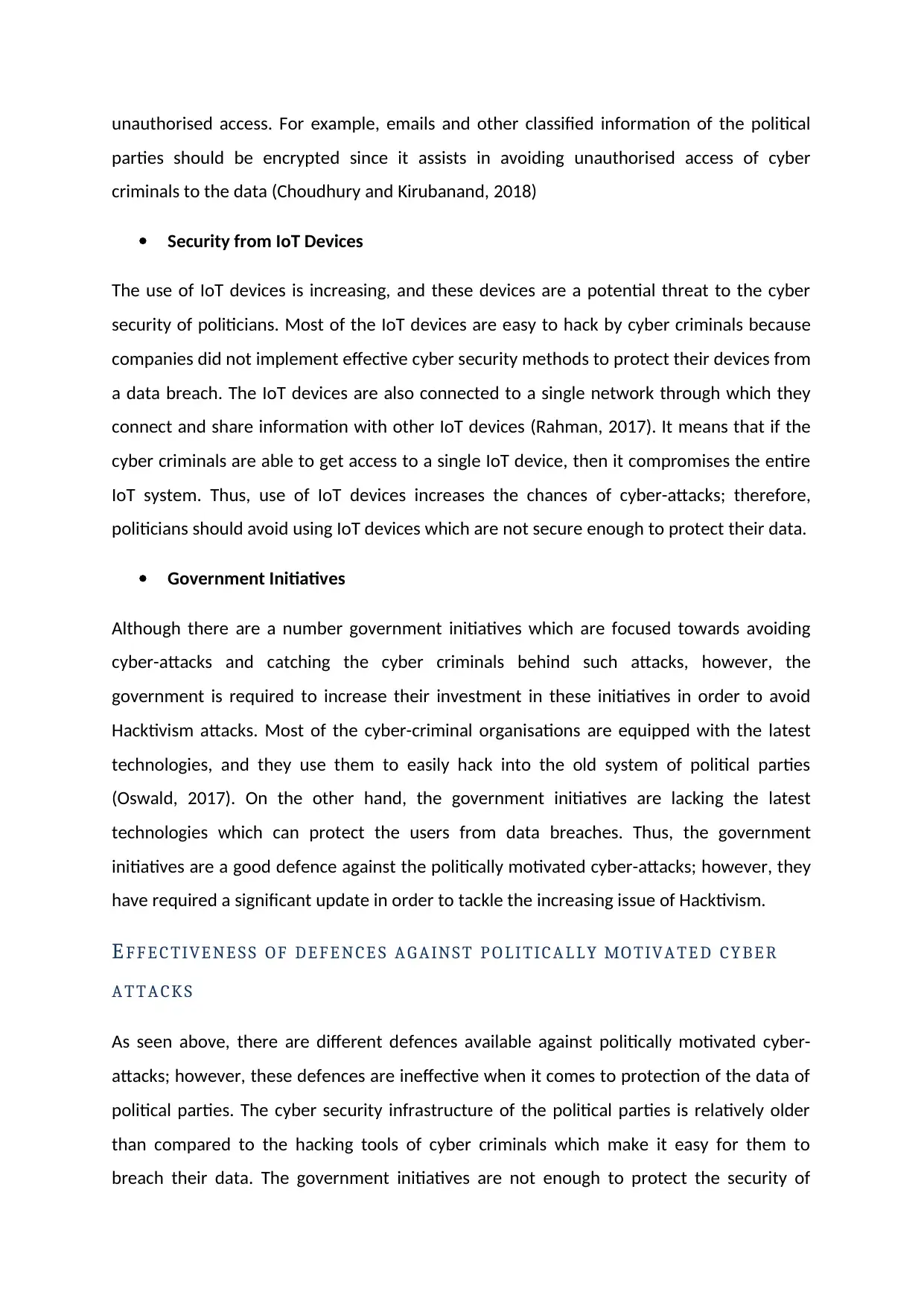
unauthorised access. For example, emails and other classified information of the political
parties should be encrypted since it assists in avoiding unauthorised access of cyber
criminals to the data (Choudhury and Kirubanand, 2018)
Security from IoT Devices
The use of IoT devices is increasing, and these devices are a potential threat to the cyber
security of politicians. Most of the IoT devices are easy to hack by cyber criminals because
companies did not implement effective cyber security methods to protect their devices from
a data breach. The IoT devices are also connected to a single network through which they
connect and share information with other IoT devices (Rahman, 2017). It means that if the
cyber criminals are able to get access to a single IoT device, then it compromises the entire
IoT system. Thus, use of IoT devices increases the chances of cyber-attacks; therefore,
politicians should avoid using IoT devices which are not secure enough to protect their data.
Government Initiatives
Although there are a number government initiatives which are focused towards avoiding
cyber-attacks and catching the cyber criminals behind such attacks, however, the
government is required to increase their investment in these initiatives in order to avoid
Hacktivism attacks. Most of the cyber-criminal organisations are equipped with the latest
technologies, and they use them to easily hack into the old system of political parties
(Oswald, 2017). On the other hand, the government initiatives are lacking the latest
technologies which can protect the users from data breaches. Thus, the government
initiatives are a good defence against the politically motivated cyber-attacks; however, they
have required a significant update in order to tackle the increasing issue of Hacktivism.
EFFECTIVENESS OF DEFENCES AGAINST POLITICALLY MOTIVATED CYBER
ATTACKS
As seen above, there are different defences available against politically motivated cyber-
attacks; however, these defences are ineffective when it comes to protection of the data of
political parties. The cyber security infrastructure of the political parties is relatively older
than compared to the hacking tools of cyber criminals which make it easy for them to
breach their data. The government initiatives are not enough to protect the security of
parties should be encrypted since it assists in avoiding unauthorised access of cyber
criminals to the data (Choudhury and Kirubanand, 2018)
Security from IoT Devices
The use of IoT devices is increasing, and these devices are a potential threat to the cyber
security of politicians. Most of the IoT devices are easy to hack by cyber criminals because
companies did not implement effective cyber security methods to protect their devices from
a data breach. The IoT devices are also connected to a single network through which they
connect and share information with other IoT devices (Rahman, 2017). It means that if the
cyber criminals are able to get access to a single IoT device, then it compromises the entire
IoT system. Thus, use of IoT devices increases the chances of cyber-attacks; therefore,
politicians should avoid using IoT devices which are not secure enough to protect their data.
Government Initiatives
Although there are a number government initiatives which are focused towards avoiding
cyber-attacks and catching the cyber criminals behind such attacks, however, the
government is required to increase their investment in these initiatives in order to avoid
Hacktivism attacks. Most of the cyber-criminal organisations are equipped with the latest
technologies, and they use them to easily hack into the old system of political parties
(Oswald, 2017). On the other hand, the government initiatives are lacking the latest
technologies which can protect the users from data breaches. Thus, the government
initiatives are a good defence against the politically motivated cyber-attacks; however, they
have required a significant update in order to tackle the increasing issue of Hacktivism.
EFFECTIVENESS OF DEFENCES AGAINST POLITICALLY MOTIVATED CYBER
ATTACKS
As seen above, there are different defences available against politically motivated cyber-
attacks; however, these defences are ineffective when it comes to protection of the data of
political parties. The cyber security infrastructure of the political parties is relatively older
than compared to the hacking tools of cyber criminals which make it easy for them to
breach their data. The government initiatives are not enough to protect the security of
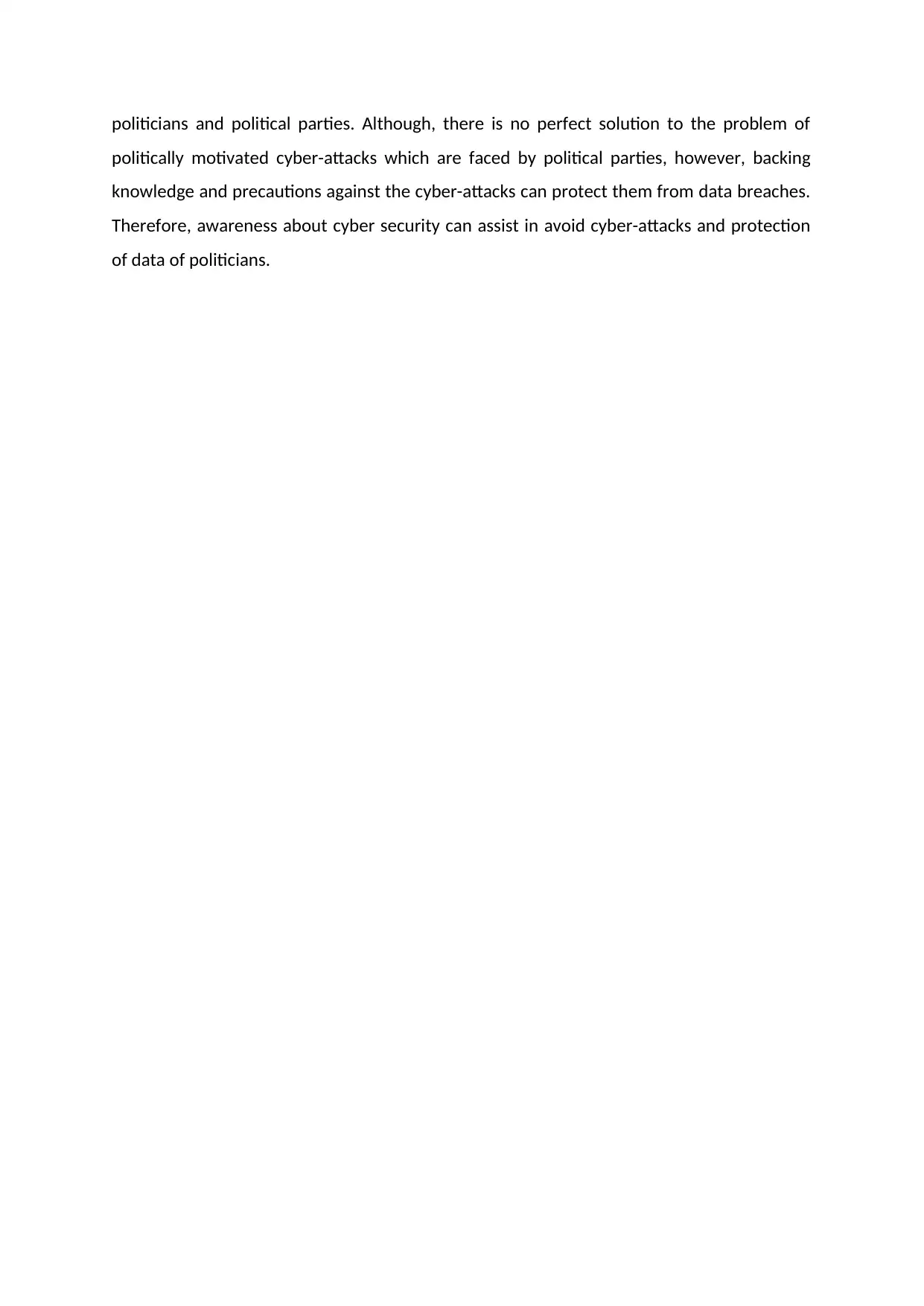
politicians and political parties. Although, there is no perfect solution to the problem of
politically motivated cyber-attacks which are faced by political parties, however, backing
knowledge and precautions against the cyber-attacks can protect them from data breaches.
Therefore, awareness about cyber security can assist in avoid cyber-attacks and protection
of data of politicians.
politically motivated cyber-attacks which are faced by political parties, however, backing
knowledge and precautions against the cyber-attacks can protect them from data breaches.
Therefore, awareness about cyber security can assist in avoid cyber-attacks and protection
of data of politicians.
⊘ This is a preview!⊘
Do you want full access?
Subscribe today to unlock all pages.

Trusted by 1+ million students worldwide
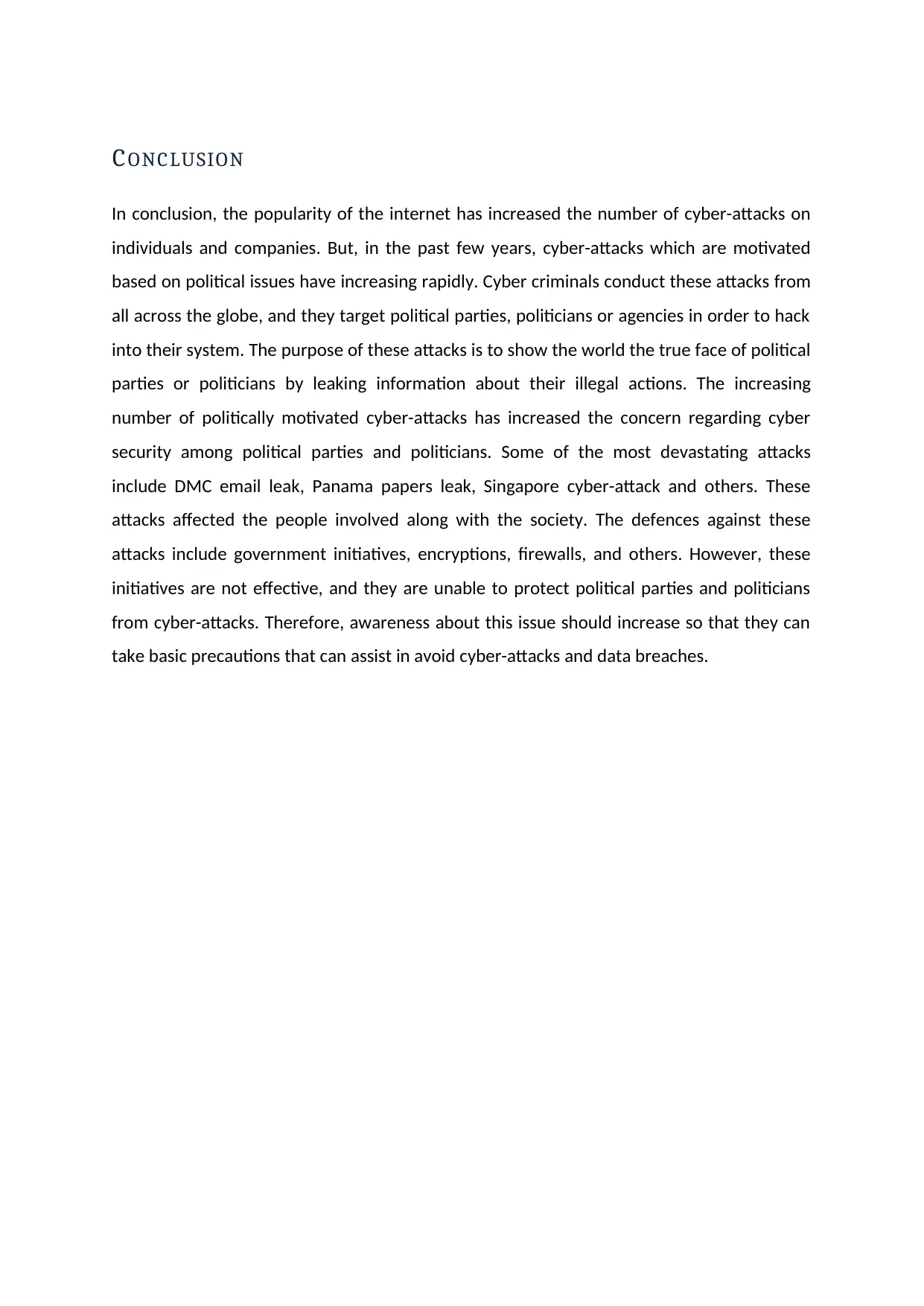
CONCLUSION
In conclusion, the popularity of the internet has increased the number of cyber-attacks on
individuals and companies. But, in the past few years, cyber-attacks which are motivated
based on political issues have increasing rapidly. Cyber criminals conduct these attacks from
all across the globe, and they target political parties, politicians or agencies in order to hack
into their system. The purpose of these attacks is to show the world the true face of political
parties or politicians by leaking information about their illegal actions. The increasing
number of politically motivated cyber-attacks has increased the concern regarding cyber
security among political parties and politicians. Some of the most devastating attacks
include DMC email leak, Panama papers leak, Singapore cyber-attack and others. These
attacks affected the people involved along with the society. The defences against these
attacks include government initiatives, encryptions, firewalls, and others. However, these
initiatives are not effective, and they are unable to protect political parties and politicians
from cyber-attacks. Therefore, awareness about this issue should increase so that they can
take basic precautions that can assist in avoid cyber-attacks and data breaches.
In conclusion, the popularity of the internet has increased the number of cyber-attacks on
individuals and companies. But, in the past few years, cyber-attacks which are motivated
based on political issues have increasing rapidly. Cyber criminals conduct these attacks from
all across the globe, and they target political parties, politicians or agencies in order to hack
into their system. The purpose of these attacks is to show the world the true face of political
parties or politicians by leaking information about their illegal actions. The increasing
number of politically motivated cyber-attacks has increased the concern regarding cyber
security among political parties and politicians. Some of the most devastating attacks
include DMC email leak, Panama papers leak, Singapore cyber-attack and others. These
attacks affected the people involved along with the society. The defences against these
attacks include government initiatives, encryptions, firewalls, and others. However, these
initiatives are not effective, and they are unable to protect political parties and politicians
from cyber-attacks. Therefore, awareness about this issue should increase so that they can
take basic precautions that can assist in avoid cyber-attacks and data breaches.
Paraphrase This Document
Need a fresh take? Get an instant paraphrase of this document with our AI Paraphraser
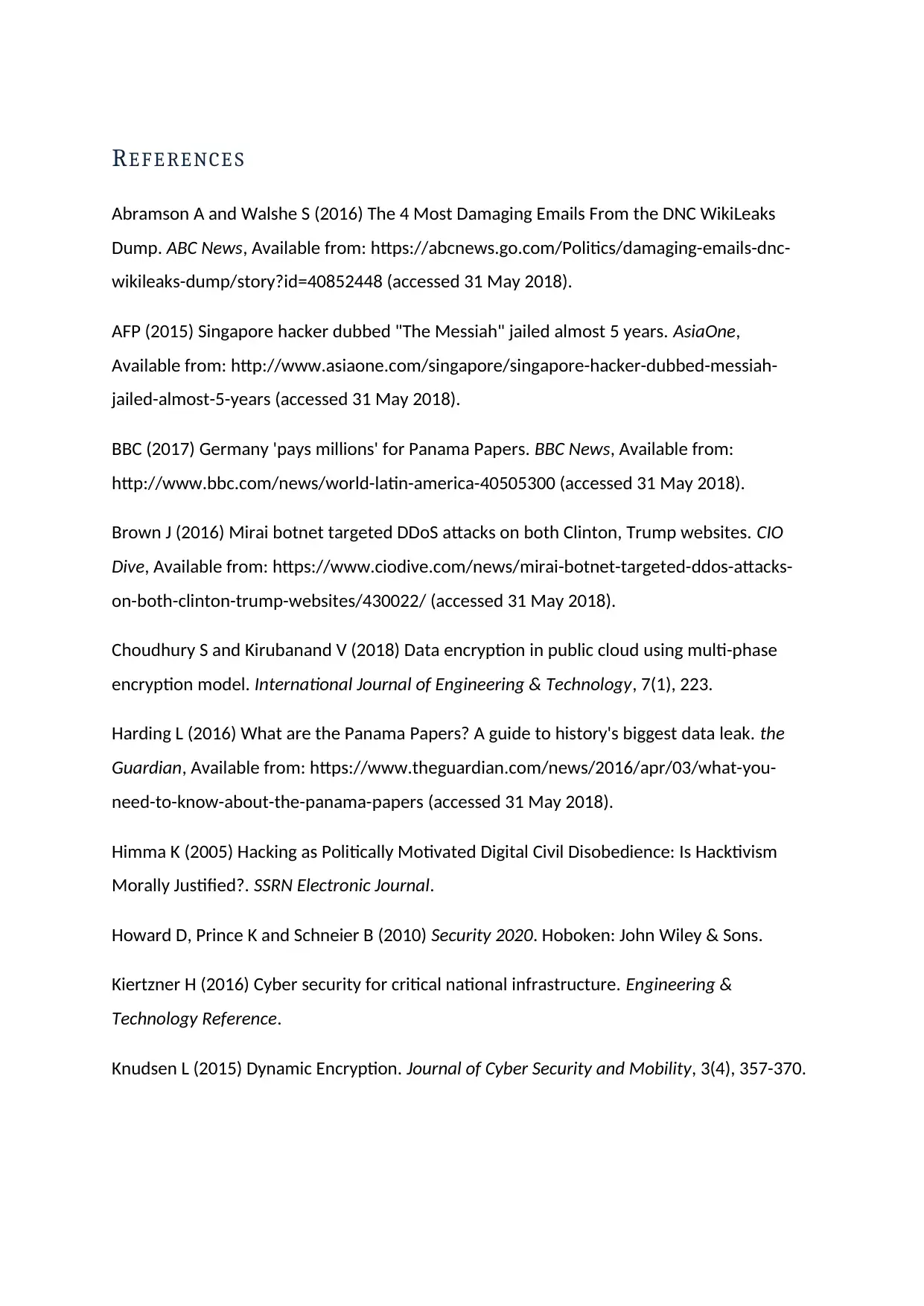
REFERENCES
Abramson A and Walshe S (2016) The 4 Most Damaging Emails From the DNC WikiLeaks
Dump. ABC News, Available from: https://abcnews.go.com/Politics/damaging-emails-dnc-
wikileaks-dump/story?id=40852448 (accessed 31 May 2018).
AFP (2015) Singapore hacker dubbed "The Messiah" jailed almost 5 years. AsiaOne,
Available from: http://www.asiaone.com/singapore/singapore-hacker-dubbed-messiah-
jailed-almost-5-years (accessed 31 May 2018).
BBC (2017) Germany 'pays millions' for Panama Papers. BBC News, Available from:
http://www.bbc.com/news/world-latin-america-40505300 (accessed 31 May 2018).
Brown J (2016) Mirai botnet targeted DDoS attacks on both Clinton, Trump websites. CIO
Dive, Available from: https://www.ciodive.com/news/mirai-botnet-targeted-ddos-attacks-
on-both-clinton-trump-websites/430022/ (accessed 31 May 2018).
Choudhury S and Kirubanand V (2018) Data encryption in public cloud using multi-phase
encryption model. International Journal of Engineering & Technology, 7(1), 223.
Harding L (2016) What are the Panama Papers? A guide to history's biggest data leak. the
Guardian, Available from: https://www.theguardian.com/news/2016/apr/03/what-you-
need-to-know-about-the-panama-papers (accessed 31 May 2018).
Himma K (2005) Hacking as Politically Motivated Digital Civil Disobedience: Is Hacktivism
Morally Justified?. SSRN Electronic Journal.
Howard D, Prince K and Schneier B (2010) Security 2020. Hoboken: John Wiley & Sons.
Kiertzner H (2016) Cyber security for critical national infrastructure. Engineering &
Technology Reference.
Knudsen L (2015) Dynamic Encryption. Journal of Cyber Security and Mobility, 3(4), 357-370.
Abramson A and Walshe S (2016) The 4 Most Damaging Emails From the DNC WikiLeaks
Dump. ABC News, Available from: https://abcnews.go.com/Politics/damaging-emails-dnc-
wikileaks-dump/story?id=40852448 (accessed 31 May 2018).
AFP (2015) Singapore hacker dubbed "The Messiah" jailed almost 5 years. AsiaOne,
Available from: http://www.asiaone.com/singapore/singapore-hacker-dubbed-messiah-
jailed-almost-5-years (accessed 31 May 2018).
BBC (2017) Germany 'pays millions' for Panama Papers. BBC News, Available from:
http://www.bbc.com/news/world-latin-america-40505300 (accessed 31 May 2018).
Brown J (2016) Mirai botnet targeted DDoS attacks on both Clinton, Trump websites. CIO
Dive, Available from: https://www.ciodive.com/news/mirai-botnet-targeted-ddos-attacks-
on-both-clinton-trump-websites/430022/ (accessed 31 May 2018).
Choudhury S and Kirubanand V (2018) Data encryption in public cloud using multi-phase
encryption model. International Journal of Engineering & Technology, 7(1), 223.
Harding L (2016) What are the Panama Papers? A guide to history's biggest data leak. the
Guardian, Available from: https://www.theguardian.com/news/2016/apr/03/what-you-
need-to-know-about-the-panama-papers (accessed 31 May 2018).
Himma K (2005) Hacking as Politically Motivated Digital Civil Disobedience: Is Hacktivism
Morally Justified?. SSRN Electronic Journal.
Howard D, Prince K and Schneier B (2010) Security 2020. Hoboken: John Wiley & Sons.
Kiertzner H (2016) Cyber security for critical national infrastructure. Engineering &
Technology Reference.
Knudsen L (2015) Dynamic Encryption. Journal of Cyber Security and Mobility, 3(4), 357-370.
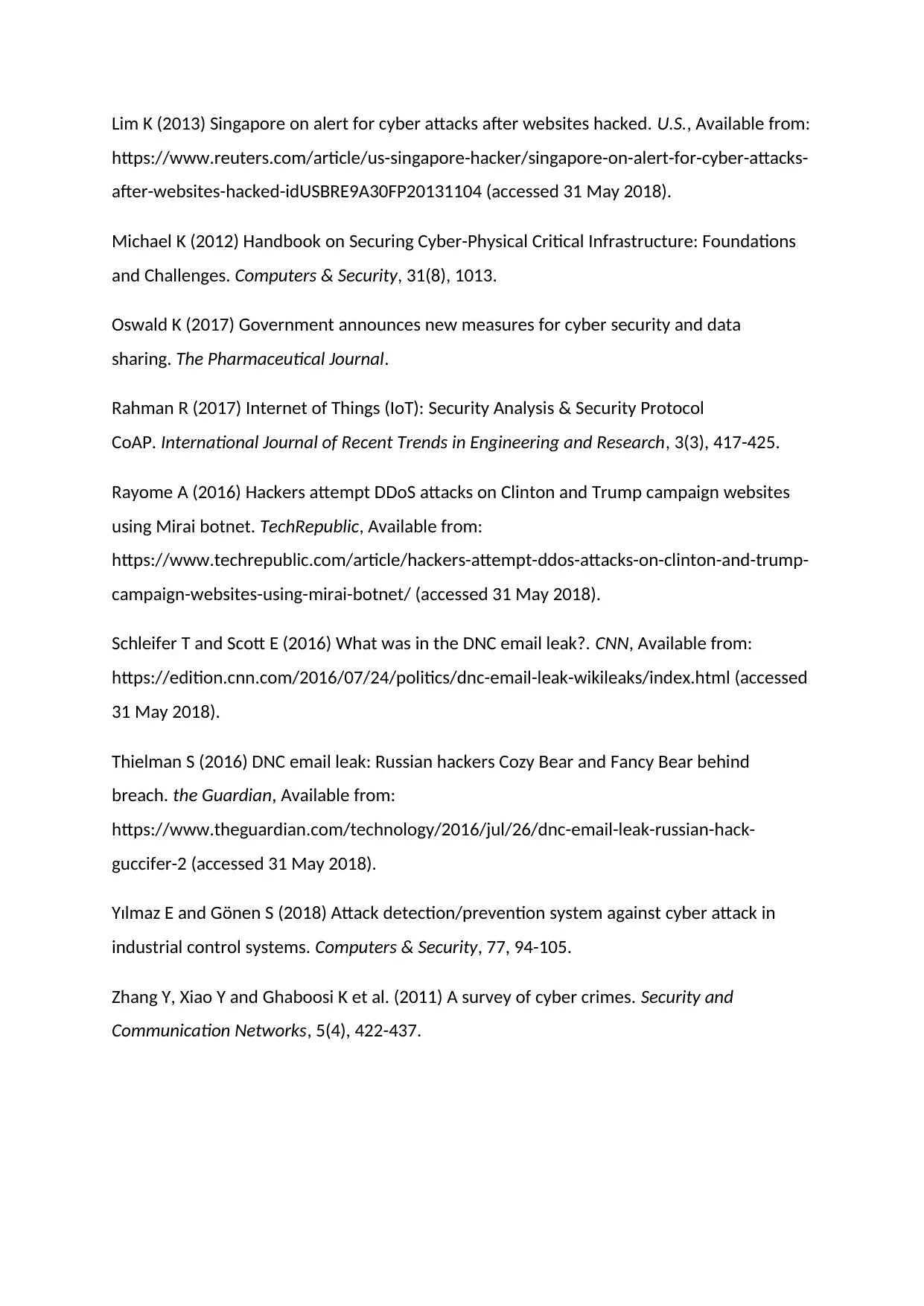
Lim K (2013) Singapore on alert for cyber attacks after websites hacked. U.S., Available from:
https://www.reuters.com/article/us-singapore-hacker/singapore-on-alert-for-cyber-attacks-
after-websites-hacked-idUSBRE9A30FP20131104 (accessed 31 May 2018).
Michael K (2012) Handbook on Securing Cyber-Physical Critical Infrastructure: Foundations
and Challenges. Computers & Security, 31(8), 1013.
Oswald K (2017) Government announces new measures for cyber security and data
sharing. The Pharmaceutical Journal.
Rahman R (2017) Internet of Things (IoT): Security Analysis & Security Protocol
CoAP. International Journal of Recent Trends in Engineering and Research, 3(3), 417-425.
Rayome A (2016) Hackers attempt DDoS attacks on Clinton and Trump campaign websites
using Mirai botnet. TechRepublic, Available from:
https://www.techrepublic.com/article/hackers-attempt-ddos-attacks-on-clinton-and-trump-
campaign-websites-using-mirai-botnet/ (accessed 31 May 2018).
Schleifer T and Scott E (2016) What was in the DNC email leak?. CNN, Available from:
https://edition.cnn.com/2016/07/24/politics/dnc-email-leak-wikileaks/index.html (accessed
31 May 2018).
Thielman S (2016) DNC email leak: Russian hackers Cozy Bear and Fancy Bear behind
breach. the Guardian, Available from:
https://www.theguardian.com/technology/2016/jul/26/dnc-email-leak-russian-hack-
guccifer-2 (accessed 31 May 2018).
Yılmaz E and Gönen S (2018) Attack detection/prevention system against cyber attack in
industrial control systems. Computers & Security, 77, 94-105.
Zhang Y, Xiao Y and Ghaboosi K et al. (2011) A survey of cyber crimes. Security and
Communication Networks, 5(4), 422-437.
https://www.reuters.com/article/us-singapore-hacker/singapore-on-alert-for-cyber-attacks-
after-websites-hacked-idUSBRE9A30FP20131104 (accessed 31 May 2018).
Michael K (2012) Handbook on Securing Cyber-Physical Critical Infrastructure: Foundations
and Challenges. Computers & Security, 31(8), 1013.
Oswald K (2017) Government announces new measures for cyber security and data
sharing. The Pharmaceutical Journal.
Rahman R (2017) Internet of Things (IoT): Security Analysis & Security Protocol
CoAP. International Journal of Recent Trends in Engineering and Research, 3(3), 417-425.
Rayome A (2016) Hackers attempt DDoS attacks on Clinton and Trump campaign websites
using Mirai botnet. TechRepublic, Available from:
https://www.techrepublic.com/article/hackers-attempt-ddos-attacks-on-clinton-and-trump-
campaign-websites-using-mirai-botnet/ (accessed 31 May 2018).
Schleifer T and Scott E (2016) What was in the DNC email leak?. CNN, Available from:
https://edition.cnn.com/2016/07/24/politics/dnc-email-leak-wikileaks/index.html (accessed
31 May 2018).
Thielman S (2016) DNC email leak: Russian hackers Cozy Bear and Fancy Bear behind
breach. the Guardian, Available from:
https://www.theguardian.com/technology/2016/jul/26/dnc-email-leak-russian-hack-
guccifer-2 (accessed 31 May 2018).
Yılmaz E and Gönen S (2018) Attack detection/prevention system against cyber attack in
industrial control systems. Computers & Security, 77, 94-105.
Zhang Y, Xiao Y and Ghaboosi K et al. (2011) A survey of cyber crimes. Security and
Communication Networks, 5(4), 422-437.
⊘ This is a preview!⊘
Do you want full access?
Subscribe today to unlock all pages.

Trusted by 1+ million students worldwide
1 out of 12
Related Documents
Your All-in-One AI-Powered Toolkit for Academic Success.
+13062052269
info@desklib.com
Available 24*7 on WhatsApp / Email
![[object Object]](/_next/static/media/star-bottom.7253800d.svg)
Unlock your academic potential
Copyright © 2020–2026 A2Z Services. All Rights Reserved. Developed and managed by ZUCOL.





